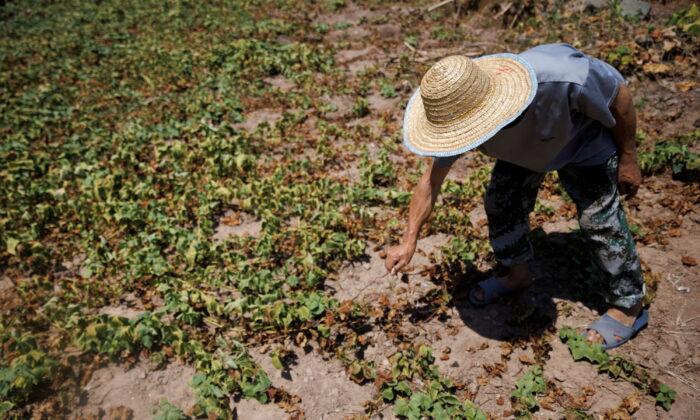CHONGQING, China—As the tinder-dry countryside along China’s Yangtze river basin withers under a heat wave that has lasted more than two months, veteran farmer Chen Xiaohua recalled the last severe drought to hit his crops more than 60 years ago.
“This year is drier than 1960,” said Chen, 68, from his plot of land in the village of Fuyuan in the rugged rural fringes of the Chongqing region in China’s southwest. “The temperature is higher.”
Chen’s small plot, situated close to the Yangtze river and its tributary, the Longxi, normally relies on fresh water from mountain streams, but that has dwindled to nothing in recent days, drying out his main crops, which includes sweet potato.
“In the past, at this time, August, sweet potato leaves grow very thick,” said Chen, wearing a wide-brimmed hat to protect himself from the fierce sun. “From August to September, sweet potato should bloom.”
As many as 66 rivers across 34 counties in Chongqing have dried up, state broadcaster CCTV said on Friday as weather service data showed a district in the region to be the country’s hottest, hitting 45 degrees Celsius ((113 degrees Fahrenheit).
Rainfall in Chongqing this year is down 60 percent compared to the seasonal norm, and the farmland in several districts is severely short of moisture, CCTV said, citing data from local authorities. The local authorities also said crops in 10 districts were suffering badly.
According to emergency ministry data on Thursday, high temperatures in July alone caused direct economic losses of 2.73 billion yuan ($400 million), affecting 5.5 million people and 457,500 hectares (1.1 million acres) of land.
The Ministry of Water Resources warned on Wednesday that soil moisture had seriously deteriorated in Chongqing, neighboring Sichuan, and several other provinces along the middle reaches of the Yangtze.
The central province of Anhui, which also relies on the Yangtze for water supplies, warned this week that excessively dry soil was affecting 88,000 hectares (217,453 acres) of autumn grain, according to CCTV.
With irrigation from the mountains now dried up, farmer Chen said he has had no choice but to carry buckets to and from a nearby pond every morning to try to save his crops. The leaves and stems have continued to die.






Friends Read Free